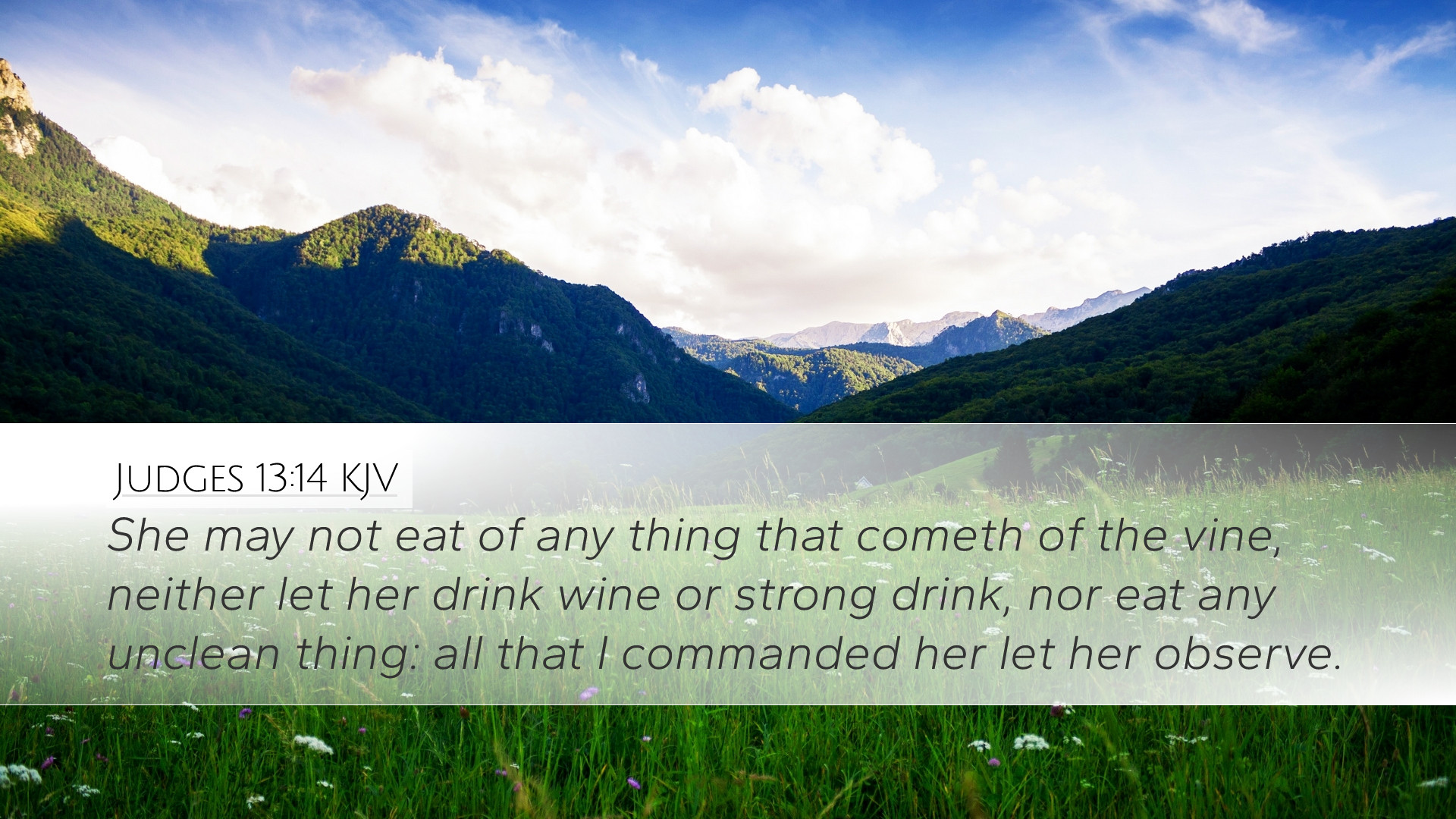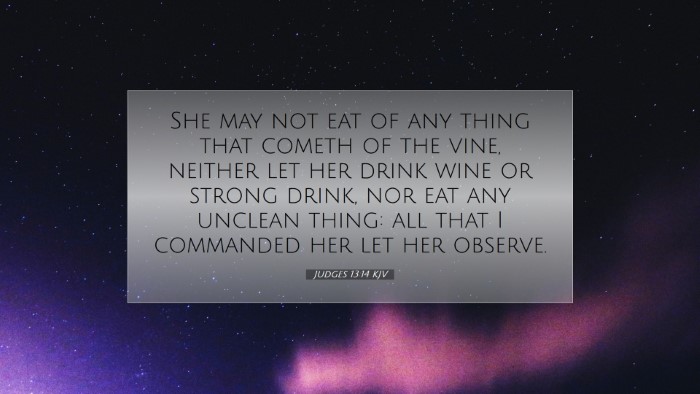Bible Commentary on Judges 13:14
Verse: Judges 13:14 - "She may not eat of any thing that cometh of the vine, neither let her drink wine or strong drink, nor eat any unclean thing: all that I commanded her let her observe."
Introduction
Judges 13 recounts the miraculous announcement of the birth of Samson, a significant judge of Israel. This particular verse highlights the instructions given to Manoah's wife, emphasizing her Nazirite vow during her pregnancy. This command holds implications not only for her personal conduct but also for the ministry of the child she would bear. Commentators throughout history have delved into the meaning behind these directives, linking them to broader themes of holiness, obedience, and the divine purpose in the lives of His chosen leaders.
Exegetical Insights
Contextual Background:
In the broader context of the Book of Judges, we witness a cycle of sin, repentance, and deliverance among the Israelites. The period is marked by a dramatic need for leadership and divine intervention. Samson's birth is framed within these cycles, where God raises a leader to contend against the Philistine oppression.
Matthew Henry’s Commentary
Henry emphasizes the divine origin of the command: it reflects God's intention to set apart Samson even before his birth. This pre-birth instruction carries a profound significance, denoting the elevated status of the Nazirite vow. Furthermore, Henry points out that the restrictions laid out for Manoah’s wife reflect God's holiness. By abstaining from wine and any unclean food, she embodies the holiness required to usher in a leader destined to deliver Israel.
Albert Barnes’ Commentary
Barnes articulates the importance of the Nazirite vow in the context of cultural practice at the time. He explains that the vow not only dictates personal restraint but also serves as a public declaration of commitment to God. In the case of Manoah’s wife, her adherence to these dietary restrictions symbolizes a life dedicated to God’s service and purity. Barnes correlates this with the responsibilities of parents to instill holiness in their children, particularly when a child is destined for a unique purpose.
Adam Clarke’s Commentary
Clarke offers a detailed examination of the nature of the “unclean” items mentioned in the verse. He associates the prohibition of vine products with the broader Nazirite ethos, which signifies separation from worldly pleasures. Clarke emphasizes the spiritual discipline involved, suggesting that true commitment to God often requires sacrifices or abstentions to fulfill His purpose. The Nazirite's abstinence functions as a mirror reflecting one’s steadfast dedication to the divine mission laid out for them.
Theological Implications
-
Holiness and Separation: The command emphasizes the necessity of holiness as a precursor to fulfilling God’s calling. The abstinence mandated by God illustrates the need for purity in both personal and community life, affirming that God’s leaders ought to be distinct from those around them.
-
Parental Responsibility: The role of Manoah's wife as a nurturer is highlighted; she is responsible for fostering an environment that aligns with God's expectations. This instruction serves as a reminder for parents today to promote spiritual discipline and purity in raising their children.
-
Divine Preparation: God meticulously prepares those He chooses for a particular purpose. The restrictions placed upon Manoah's wife were not merely arbitrary but focused on adequately preparing her and the child for the work ahead, reinforcing that God is at work even before His servants are born.
Practical Applications
-
Embracing Holiness: Modern believers are called to embrace holiness in their lives, recognizing that their actions can reflect their commitment to God. Just as Manoah’s wife was instructed to maintain purity, Christians today should seek to avoid practices that lead to spiritual compromise.
-
The Role of the Community: The community’s part in upholding spiritual standards is crucial. Churches should support parents in their efforts to raise children in ways that honor God's commands, fostering environments that encourage spiritual growth.
-
Understanding Vows: The significance of personal vows to God should not be understated. Modern equivalents might include commitments to serve or lead, and these should be taken with seriousness as they represent a covenant with God to fulfill His purposes.
Conclusion
Judges 13:14 encapsulates essential themes of holiness, divine purpose, and parental responsibility within the framework of being set apart for God’s service. The profound import of God’s commands to Manoah's wife not only shaped the life of Samson but serves as an enduring lesson for believers today. By adhering to God’s call for holiness and understanding the significance of our commitments, we can indeed walk in the paths laid out for us by our Creator.


